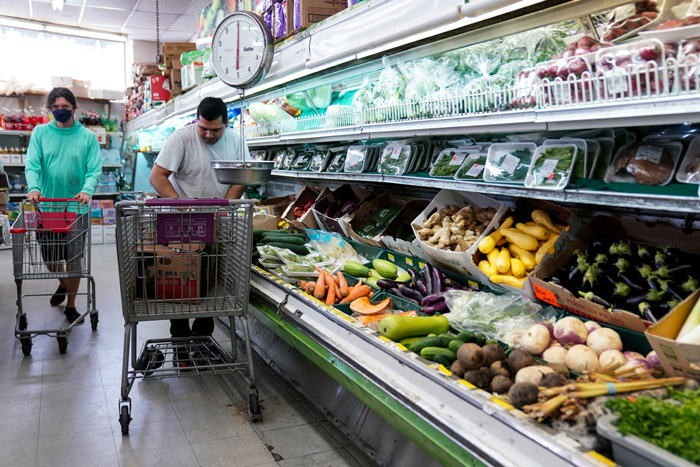|
A man arranges produce at Best World Supermarket in the Mount Pleasant neighborhood of Washington, D.C., US, August 19, 2022. REUTERS/Sarah Silbiger
The past few months of robust grocery store sales would suggest shoppers in the US aren’t stretched for cash. But that’s not the full story.
Food manufacturers like Kellogg, PepsiCo and Nestlé all reported sales growth in the first quarter of the year.
But even though sales are up, people are buying less.
Growth has been fueled by higher prices, which offset declining volumes.
"If you look at the top-line dollar sales, it is obviously very positive,” said Alastair Steel, an executive for client engagement at market research firm Circana. “But it really is driven by price increases.”
For the period ending on May 21, compared to the same period in 2022, sales of fresh eggs by volume fell 4.7%, milk dropped 3.9%, packaged bread fell 3.8%, and fresh root vegetables slid 3.5%, according to Circana, which tracks US retail sales.
In that time, dollar sales of eggs rose by 41.2%, milk rose by 0.9%, bread jumped 8.5% and fresh root vegetables rose 10.7%.
Steel noted early in the pandemic, when people stopped eating at restaurants and stocked up on pantry staples, unit sales soared.
Since then, they’ve been coming down.
Some of that can be attributed to an “unwinding” of that 2020 boom, he noted.
At that time, people could also use stimulus payments to cover costs. Those who were working from home didn’t have to spend money commuting.
Dining in isn’t the only way people are saving.
Some Americans are trading down by going for cheaper items, or shopping at bargain stores.
In the first four months of 2023, food prices went up by 7.7%, with grocery prices rising 7.1% and menu prices increasing 8.6%, according to data from the BLS’ Consumer Price Index.
Prices overall rose 4.9% throughout the year.
> WHO guideline on sweeteners sparks criticism
[Photo/unsplash]
Sugar substitutes such as stevia, aspartame and sucralose do not help people lose weight in the long run and may instead pose health risks, the World Health Organization has warned.
A systematic review of the available evidence "suggests use of NSS [non-sugar sweeteners] does not confer any long-term benefit in reducing body fat in adults or children,” the WHO said in a statement.
“Results of the review also suggest there may be potential undesirable effects from long-term use of NSS, such as an increased risk of type 2 diabetes, cardiovascular diseases, and mortality in adults,” it added.
“People need to consider other ways to reduce free sugars intake, such as consuming food with naturally occurring sugars like fruit, or unsweetened food and beverages,” said Francesco Branca, WHO director for nutrition and food safety.
Artificial sweeteners are “not essential dietary factors and have no nutritional value,” Branca emphasized. “People should reduce the sweetness of the diet altogether, starting early in life, to improve their health."
Formulating recommendations that are not supported by strong scientific evidence is inappropriate and could unnecessarily deter the public from personal choice and potentially beneficial dietary options, according to the Calorie Control Council, a low-calorie food and beverage interest group.
“The world's most highly regarded health and regulatory agencies have thoroughly reviewed this evidence and have validated the role of these ingredients. Along with exercise and a healthy diet, low- and no-calorie sweeteners are a critical tool that can help consumers manage body weight and reduce the risk of non-communicable diseases,” council president Robert Rankin said.
Find more audio news on the China Daily app. (责任编辑:) |

